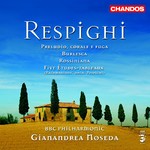
Orchestral Works Vol 2: Buerlesca / Rossiniana / etc
 $40.00
Out of Stock
$40.00
Out of Stock6+ weeks add to cart
RESPIGHI
Orchestral Works Vol 2: Buerlesca / Rossiniana / etc
BBC Philharmonic / Gianandrea Noseda (cond)
[ Chandos / CD ]
Release Date: Friday 24 November 2006
This item is currently out of stock. It may take 6 or more weeks to obtain from when you place your order as this is a specialist product.
'Performances of all four works are outstanding, with the Chandos sound bringing out the full richness of Respighi's writing. How sad that he died so young.'
Gramophone
'Respighi has gradually been rehabilitated in recent years, and Gianandrea Noseda is just the conductor to bring out the exhilaration of works such as 'Burlesca' and the 'Preludio, corale e fuga', an early work written under the supervision of Rimsky-Korsakov, from whom the 20-year-old Respighi had lessons. It's not just a tour de force: the material is subtly handled and has individuality.'
Sunday Telegraph
'Noseda and his players respond in kind… dazzling in the Rossini and profound in the Rachmaninov. The warm sound is up to Chandos's usual standards.'
BBC Music Magazine
'Performances of all four works are outstanding, with the Chandos sound bringing out the full richness of Respighi's writing. How sad that he died so young.'
Gramophone
'Noseda, whose previous Respighi disc for Chandos showed him the most congenial of interpreters, invests a sense of utter belief in original works and transcriptions alike, and is marvellously and plushly recorded.'
International Record Review
The disc features some of Respighi's rarer works.
Straddling the 19th and 20th centuries, Respighi is best known for his three spectacularly orchestrated Roman tone poems and as a brilliant arranger and transcriber of other composers' works. Yet, in truth; Respighi does not merely transcribe, he unashamedly improves on the original in a remarkably innovative and harmonically daring manner. This is clearly demonstrated by the fantastic performances given here by the BBC Philharmonic under the baton of Gianandrea Noseda who takes on his fellow Italian's music with all the romance of a true Italian.
The four works on this disc are all different in character, inspiration and instrumental colour, and reveal Respighi's development as a master of orchestration over a period of some thirty years. The florid and inventive Preludio, Corale e Fuga was the work with which Respighi took his diploma in composition, and is a truly astonishing work. On hearing it, his teacher Giuseppe Martucci exclaimed: 'Respighi is not a pupil, Respighi is a master'.
In Burlesca, hints of Smetana and Dvorak, one of Respighi's favourite composers are audible and it provides further evidence of Respighi's remarkable talent for assimilating the style of other composers, while never forfeiting his own individuality. This is 'impressionistic' music at its finest.
Rossiniana is based on a volume of piano pieces by Rossini called Les Riens. This is a rarely performed work yet has all the characteristics of Respighi's orchestration.
Completing the programme is Respighi's orchestration of five of Rachmaninov's etudes-tableaux. On hearing that Respighi would orchestrate the works, Rachmaninov wrote to him saying "This good news gives me great joy, for I am sure that in your masterly hands these Etudes will be made to sound marvellous." On hearing this orchestration it is clear how Respighi magically enters into the spirit of Rachmaninov's music and re-interprets it in his own true style. It is a joy to hear it in the hands of the BBC Phiharmonic which is renowned for the great energy, virtuosity and vibrancy of its performances, and the perfect exponents of the compositions of one of the greatest orchestrators of all time
Tracks:
Burlesca, P 59 (1906)
Preludio, corale e fuga, P 30 (1901)
Rossiniana, P 148 (1925)
Five Études-tableaux, P 160 (1930)



